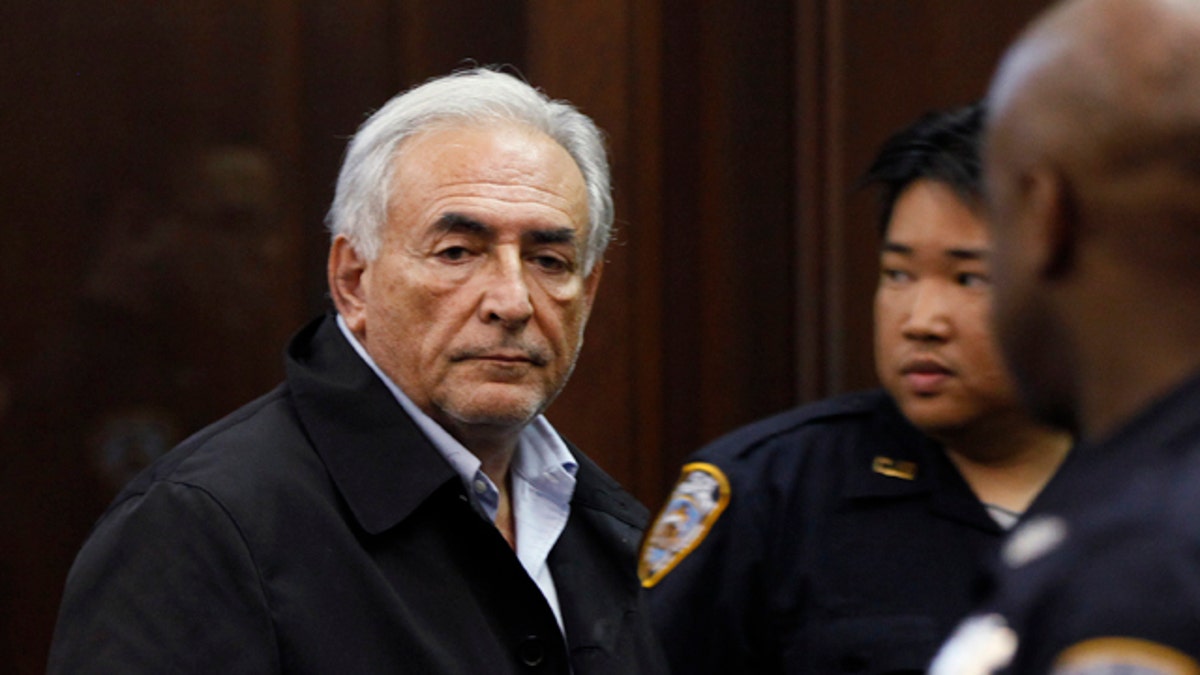
May 16: Dominique Strauss-Kahn, former head of the International Monetary Fund, leaves court after his arraignment in Manhattan Criminal Court for the alleged attack on a maid who went into his penthouse suite at a hotel near Times Square to clean it, in New York. (Reuters)
BRUSSELS -- The European Commission insisted Thursday that next leader of the International Monetary Fund must come from the 27-nation European Union, a stance backed by the Germany, the continent's economic heavyweight.
Frenchman Dominique Strauss-Kahn resigned as IMF chief Wednesday, saying he wants to devote "all his energy" to fighting sexual assault charges in New York.
The move heated up cross-border debate over his successor, with Europe aggressively staking its traditional claim to the job to ensure that Europe's debt crisis is given priority. Fast-growing nations such as China, Brazil and South Africa are trying to break Europe's grip on an organization empowered to direct billions of dollars to stabilize the global economy.
EU Commission spokeswoman Pia Ahrenkilde Hansen said the EU wants continuity at the helm of the IMF and said its members can "identify strong candidates in the midst of the European Union."
In Berlin, German Chancellor Angela Merkel pushed for a quick decision on a successor to Strauss-Kahn and underlined her hopes that a European will get the job.
"It is of great significance, of course, that we find a quick solution," she said in Berlin Thursday, without naming specific candidates.
The IMF's executive board released a letter from Strauss-Kahn on Wednesday in which he denied the allegations lodged against him but said with "sadness" he felt he must resign, to protect his family and the IMF.
"It is with infinite sadness that I feel compelled today to present to the executive board my resignation from my post of managing director of the IMF," the five-paragraph letter said. "I think at this time first of my wife -- whom I love more than anything -- of my children, of my family, of my friends. I think also of my colleagues at the Fund. Together we have accomplished such great things over the last three years and more.
"I deny with the greatest possible firmness all of the allegations that have been made against me. I want to protect this institution which I have served with honor and devotion, and especially -- especially -- I want to devote all my strength, all my time and all my energy to proving my innocence."
Strauss-Kahn is facing a bail hearing Thursday in New York that could have spelled the end of his leadership of the IMF anyway. He faces charges of assaulting a maid in a New York hotel room and has been jailed in New York since Monday.
The maid, a 32-year-old immigrant from the West African nation of Guinea, told police that the 62-year-old Strauss-Kahn came out of the bathroom naked, chased her down, forced her to perform oral sex on him and tried to remove her underwear before she broke free and fled.
The IMF's statement late Wednesday said the process of choosing a new leader would begin, but in the meantime John Lipsky would remain its acting managing director.
Europeans have led the IMF since its inception after World War II. Americans have occupied both the No. 2 position at the IMF and the top post at its sister institution, the World Bank. The World Bank funds projects in developing countries.
France's Finance Minister Christine Lagarde emerged as a potential candidate. A sharp, articulate negotiator with impeccable English who lived for many years in the United States, Lagarde has a strong international reputation.
"I am convinced that she is a good candidate. I made a few trips with her to Asia. I was able to verify her popularity among ministers of large emerging countries," France's transport minister, Thierry Mariani, told France-Info radio Thursday.
While Lagarde's name has surfaced in other capitals, Mariani was the first member of the French government to speak about it publicly.
However, Lagarde is a member of French President Nicolas Sarkozy's conservative UMP party, and if Sarkozy openly pushes for her candidacy, that could feed widespread belief in France that the accusations against Strauss-Kahn were part of a conspiracy to knock him off his path toward the French presidency.
"There is no time to waste, because we have a lot of issues to deal with," French Foreign Ministry spokesman Bernard Valero told The Associated Press on Thursday.
Developing nations see Europe's stranglehold on the position as increasingly out of touch with the world economy. China's is now the world's second largest economy. India's and Brazil's have cracked the top 10. Many emerging economies are sitting on stockpiles of cash and have become forces of financial stability, while rich countries have become weighed down by debt.
"We must establish meritocracy, so that the person leading the IMF is selected for their merits and not for being European," Brazilian Finance Minister Guido Mantega said, calling for a "new criteria" for leadership. "You can have a competent European ... but you can have a representative from an emerging nation who is competent as well."
China suggested it was time to shake things up at the IMF, with Foreign Ministry spokeswoman Jiang Yu saying the leadership "should be based on fairness, transparency and merit."
The United States has a major say in determining who will head the fund, in part because it holds the largest number of votes. The prevailing view among analysts and former Treasury officials appears to be that Washington would back a strong European candidate who could be approved in a smooth process.
Other potential European candidates include Germany's former central bank chief, Axel Weber; the head of Europe's bailout fund, Klaus Regling; and Peer Steinbrueck, a former German finance minister.
Candidates from elsewhere include Turkey's former finance minister, Kemal Dervis; Singapore's finance chief, Tharman Shanmugaratnam; and Indian economist Montek Singh Ahluwalia.
